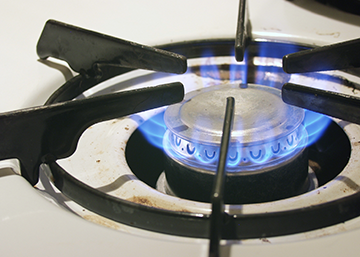
BY ELAINE GOODMAN
Daily Post Correspondent
Despite a court ruling that prompted Menlo Park to stop enforcing a ban on natural gas in new buildings, the city hasn’t given up on its building electrification goals.
The city’s Environmental Quality Commission will discuss on Wednesday (March 20) different approaches to phasing out gas from new and existing buildings.
And City Council voted 4-1 last week to schedule a study session to evaluate its options regarding a gas ban.
The discussions come after the Ninth Circuit Court of Appeals struck down the city of Berkeley’s ban on gas lines in new buildings in a lawsuit filed by the California Restaurant Association. The three-judge panel cited the federal Energy Policy and Conservation Act, which blocks local governments from regulating the energy use of appliances.
Menlo Park stopped enforcing its rules on natural gas in new construction in October in light of the court’s ruling in the Berkeley case.
Menlo Park’s rules, which took effect in 2020, required electricity to power space heating, water heating and clothes dryers in new homes of three stories or less. Natural gas stoves were still allowed. Taller residential buildings, as well as non-residential buildings, were required to be all-electric with some exceptions.
Now the city is looking at how to move forward with building electrification despite the court’s decision.
“We’re saying, spend staff time to learn about the options and explore the legal options,” said Councilwoman Maria Doerr, who proposed holding a study session on the issue.
Council voted 4-1 in favor of the proposal, with Vice Mayor Drew Combs opposed.
Combs said crafting new ordinances to get around the Ninth Circuit decision could turn into a “cat-and-mouse game.” He said a better approach might be to offer incentives to electrify buildings and streamline the permitting process.
“Residents are encountering lots of friction,” Combs said of the permitting process. “And these are the ones who are voluntarily making this transition.”
A goal of the city’s 2030 Climate Action Plan is to “explore policy/program options to convert 95% of existing buildings to all-electric by 2030.” The idea is to reduce greenhouse gas emissions from buildings.
On Wednesday, the city’s Environmental Quality Commission will hear from a subcommittee that is proposing a two-pronged approach to building electrification.
In one proposed step, the city would require new appliances to be zero-emission when it comes to nitrogen oxides – substances that contribute to air pollution. The requirement would essentially be a ban on gas appliances, since those currently don’t meet the zero-emission standard.
In the subcommittee’s second proposed step, the city would set an energy design rating for new buildings, using what’s called a single-margin approach.
All-electric buildings would meet the energy design rating, but buildings using natural gas and electricity would need additional measures, such as installing solar and energy storage systems. The buildings would also have to be equipped with electrical circuits and panels that would allow them to go all-electric in the future.
The subcommittee is proposing that the city adopt the two ordinances at the same time. The single-margin approach would only be enforced if the nitrogen-oxides standard for appliances was suspended.
“Having dual ordinances can be a deterrent to litigation,” the group said in a presentation for Wednesday’s meeting.
The cities of San Jose, Santa Cruz, and San Luis Obispo have adopted single margin codes, and Atherton discussed the idea in a study session, according to the presentation.
The Palo Alto City Council last month voted to explore a “one margin standard,” similar to the single-margin approach being discussed in Menlo Park, as a way to encourage building electrification. At the same meeting, council voted to suspend its ban on natural gas in new buildings in response to the Ninth Circuit decision in the Berkeley case.
The subcommittee’s proposed zero-emission standard would apply to appliances in new buildings or when an appliance is replaced in an existing building. That’s similar to rules adopted by the Bay Area Air Quality Management District in March 2023 for furnaces and water heaters that take effect starting in 2027.
The town of Los Altos Hills adopted a zero-emission appliance standard last month, the subcommittee said.
The subcommittee’s recommendations also include tenant protections, education, and outreach to residents, businesses, developers, and contractors. The group would also like to see permit streamlining for building electrification and resources for owners of multi-family buildings.
